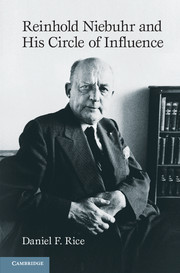Book contents
- Frontmatter
- Contents
- Acknowledgments
- Introduction
- Chapter 1 Paul Tillich (1886–1965)
- Chapter 2 John Dewey (1859–1952)
- Chapter 3 Norman Thomas (1884–1968)
- Chapter 4 Arthur Schlesinger Jr. (1917–2007)
- Chapter 5 Hans Morgenthau (1904–1980)
- Chapter 6 George Kennan (1904–2005)
- Chapter 7 Felix Frankfurter (1882–1965)
- Afterword
- Index
- References
Chapter 6 - George Kennan (1904–2005)
Published online by Cambridge University Press: 05 November 2012
- Frontmatter
- Contents
- Acknowledgments
- Introduction
- Chapter 1 Paul Tillich (1886–1965)
- Chapter 2 John Dewey (1859–1952)
- Chapter 3 Norman Thomas (1884–1968)
- Chapter 4 Arthur Schlesinger Jr. (1917–2007)
- Chapter 5 Hans Morgenthau (1904–1980)
- Chapter 6 George Kennan (1904–2005)
- Chapter 7 Felix Frankfurter (1882–1965)
- Afterword
- Index
- References
Summary
George Kennan ranks high on the list of America’s most respected diplomats – a man whom the historian Arthur Schlesinger Jr. praised as holding “our American democracy to the highest standards of responsible public and historical discourse” and who was “the conscience of the republic.” Although Reinhold Niebuhr did not have the close relationship with Kennan that he had with Hans Morgenthau, Niebuhr and Kennan had a sufficient degree and quality of contact to warrant special attention. All three men were political realists who shared an interest in international relations and had a measurable impact on foreign policy thinking in post–World War II America. Although they had little personal contact, Niebuhr and Kennan influenced each other, worked together on occasion, and voiced mutual admiration and respect.
An appropriate starting point for understanding the Niebuhr/Kennan relationship can be found in the familiar story of Kennan’s having cited Niebuhr as being the “father of all of us” – referring to Niebuhr’s having been a major influence on the group of political realists that included Kennan. Niebuhr biographer Richard W. Fox questioned the veracity of that story. However, Morgenthau’s former student, political theorist Kenneth W. Thompson, insisted that when Kennan was called to discuss the memorial tribute to Niebuhr that he was to deliver before the American Academy of Arts and Letters, “he used the words ‘Niebuhr is the father of us all.’”
- Type
- Chapter
- Information
- Reinhold Niebuhr and His Circle of Influence , pp. 174 - 204Publisher: Cambridge University PressPrint publication year: 2012

